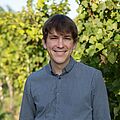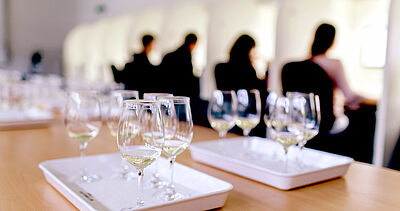Identification and technological enrichment
bioactive ingredients in non-alcoholic wines and sparkling wines
Research background
With an annual consumption of 10.6 liters of pure alcohol, Germany is one of the high-consumption countries and is above the average for OECD countries. The WHO recommends measures to reduce alcohol consumption in terms of pricing, availability and advertising; this includes the recommendation that drinks containing alcohol should only be sold in separate stores. Such a restriction, which was also discussed in the EU a few years ago, would have far-reaching negative effects on self-marketing wine producers. The development of alcohol-free or alcohol-reduced wines as a contribution to reducing alcohol consumption is therefore becoming increasingly important for both health policy and economic reasons. In order to increase consumer acceptance for this product segment, which has been lacking up to now, the favorable biological and health effects of alcohol-free wines and sparkling wines are to be researched as part of the research project.
Processes used
As the carbohydrates previously contained are largely broken down after fermentation, alcohol-free wine and sparkling wine can be advertised as a calorie-reduced drink that contains a large number of bioactive ingredients (especially phenolic compounds and minerals). The focus of the studies is on phenolic compounds. They are known to exert numerous beneficial effects in the body. These include anti-oxidative, anti-inflammatory, anti-carcinogenic and anti-diabetic effects. In many cases, however, the compounds that are primarily responsible for these activities have not yet been clearly identified at the molecular level. Due to these gaps in knowledge, it is therefore also difficult to adapt the technological processes in a targeted manner in order to enrich these bioactive key compounds in the beverage. Therefore, in the course of an activity-guided isolation from non-alcoholic wines and sparkling wines, bioactive phenolic secondary metabolites are to be isolated and identified, which show a favorable influence on carbohydrate and lipid metabolism. After targeted technological enrichment of these components, the effectiveness of a test drink optimized according to the research results obtained is to be tested in a human intervention study (proof-of-concept).
Aim of the research project
The aim of the research project is to produce wines with a technologically high content of bioactive wine ingredients, which can be consumed in larger volumes as non-alcoholic wines and sparkling wines after alcohol withdrawal, without any harmful alcohol intake. This requires a sufficient quantity and composition of bioactive polyphenols for physiological effects in order to achieve the desired physiological effects.
Research centers
Rural Area Service Center (DLR) Rhenish Palatinate, Neustadt/Weinstraße Institute of Viticulture and Enology Prof. Dr. Ulrich Fischer/Dr. Patrick Nickolaus Braunschweig University of Technology Institute of Food Chemistry Prof. Dr. Peter Winterhalter/Dr. Recep Gök Rhineland-Palatinate University of Technology Kaiserslautern-Landau (RPTU) Department of Chemistry Department of Food Chemistry and Toxicology Prof. Dr. Elke Richling |
About the researcher
Katrin Oster studied Nutrition and Food Science at the University of Bonn and Viticulture and Enology at Hochschule Geisenheim University. Over the past 3 years, she has helped to establish a young company that specializes entirely in non-alcoholic wines. At the Rural Area Service Center (DLR) Rhenish Palatinate she works as a research assistant on the project "Bioactive ingredients in non-alcoholic wines".
contact

Dr. Patrick Nickolaus

Katrin Oster

